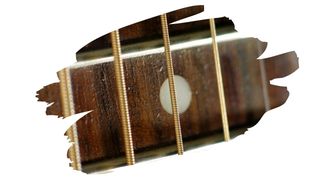Fretboard oils act like a moisturizer for wood, preventing your fretboard from drying out and cracking. As a result, there are numerous fretboard oils on store shelves, all promising that their product will keep your instrument in tip top condition.
But, are those lemon oil products really the only oil you can safely use to condition your guitar?
Well, in this post, you will learn what really goes into that specialist ‘lemon‘ fretboard oil. You will also find out the difference between a non-drying oil and a drying oil…and why this matters when it comes to unfinished fretboards.
And we reveal the best alternative to those fretboard oil products…

This post may contain affiliate links to products that we receive a commission for (at no additional cost to you). Learn more here.
What Can You Use To Condition A Guitar Fretboard?
The best thing you can use to condition a fretboard is 100% pure food grade mineral oil. This oil doesn’t dry or harden, and it doesn’t go rancid.
Which is why most guitar fretboard oil products on the market are simply mineral oil. They’re only called ‘Lemon Oil’ because they’ve added a few drops of lemon essential oils to the mix for the aroma.
But, the base ingredient in fretboard oil is pretty much just plain old mineral oil.
Now, the reason why mineral oil is so widely used as a fretboard conditioner, is because this stuff never dries. And the reason mineral oil never dries (or go rancid) is because it is made from refined petroleum (yes, that exact petroleum stuff that we get out of the ground).
However, food grade mineral oil has been specially refined so that it has been filtered of all toxins. Which is why this non-drying oil is food safe enough to use to condition even a cutting board surface.
What Is A Non Drying Oil? A Non-Drying Oil, (such as Mineral oil), is an oil that does not dry or harden. This type of oil will simply soak into wood, rehydrating parched wood grain. A Drying Oil, (such as Linseed oil or Tung oil), is an oil that will dry and harden into a resin. This type of oil will soak into wood too, but it will also build up a solid coat on the surface of your fretboard.
Is Fretboard Oil Even Necessary?
It depends on whether your fretboard is finished or unfinished.
Finished fretboards have been coated with a sealing finish or drying oil. This protects the wood of that fretboard from cracking and drying out. In which case, fretboard oils aren’t needed.
Also, in some cases, even an unfinished fretboard doesn’t require an oil finish… as is the case with Rosewood fretboards. Rosewood is a naturally oily wood. And a fretboard made from this durable lumber rarely (if ever) needs oiling.
Otherwise, if your fretboard is unfinished and unsealed, then overtime it can dry out. And once that happens, you will begin to see little cracks and fractures appear along its surface.
So, to stop those cracks from ever appearing, you should oil an unfinished fretboard every 6-12 months.
There is no need to overdo it though. You only need to put a very light application of fretboard oil onto that timber surface. The last thing you want is to make it too greasy to play.
Related Post: Can You Use Orange Oil To Condition A Dry Guitar Fretboard? (Revealed!) | The Woodwork Place
Is Mineral Oil My Only Choice? What Is The Best Alternative To Lemon Oil For Fretboards?
To condition a fretboard you need to use an oil that; A) Won’t go rancid, and B) Won’t dry and solidify.
Now, there are very few options out there that fit these two criteria as well as mineral oil does. This is because most non-drying oils are food based (such as Olive oil or Almond oil). And so these food based oils will go rancid over time.
However, there is one food-based oil that does fit the criteria for fretboard oil surprisingly well. And that oil is Fractionated Coconut Oil.
Can You Really Use Coconut Oil On A Guitar Fretboard?
First off, just to be clear, we are not talking about unrefined coconut oil. Unrefined coconut oil is a culinary oil. And as such, it will go off and become rancid, just like any other cooking oil.
So, don’t use this version of coconut oil on your fretboard!
The only type of coconut oil that will work on a fretboard is a heavily filtered version of coconut oil.
So, What Is Fractionated Coconut Oil Exactly?
This refined version of coconut oil has gone through a treatment that removes all of the fatty acids naturally found in pure coconut oil.
Those fatty acids have a short shelf life, and they are responsible for coconut oil going rancid. So, by removing these fats, you end up with a more watery version of coconut oil that won’t go off.
This fractionated version of coconut oil is odorless, food safe, and non-toxic. And it will work just as well as mineral oil, when it comes to rejuvenating worn-out fretboards.
What Is The Best Fractionated Coconut Oil For My Guitar Fretboard?
The best fractionated coconut oil you can get comes from Verdana. Their USDA certified fractionated coconut oil has no additives or hidden ingredients.
Made in the USA, Verdana’s fractionated oil is made from 100% pure coconut oil.
You can buy it by the gallon (which is more budget friendly). However, just like with mineral oil, you don’t need to apply much fractionated coconut oil onto your fretboard to keep it conditioned. So, only buy what you need.
You can get the latest prices for fractionated coconut oil over on Amazon.
To Wrap Up, Here Are The 3 Key Takeaways From This Post…
- 1). Most fretboard oils, (including ones marketed as lemon oil), are made from food-grade mineral oil.
- 2). Food grade mineral oil is made from refined petroleum oil, so it does not dry or go rancid.
- 3). If you want to use an alternative to mineral oil, you can use fractionated coconut oil. This filtered version of coconut oil does not go rancid, and will work just as well as mineral oil at preventing fretboards from drying out.
References:
Willing, Andreas. “Lubricants based on renewable resources–an environmentally compatible alternative to mineral oil products.” Chemosphere 43.1 (2001): 89-98.

